 sauerbraten,
sauer-braten, sourbraten
n.
sauerbraten,
sauer-braten, sourbraten
n.-
 from Sauerbraten "sour
roast": beef marinated in vinegar and seasonings before roasting
from Sauerbraten "sour
roast": beef marinated in vinegar and seasonings before roasting
- sauerkraut, sauer-kraut, kraut, sourkraut, sourkrout, sour-krout, saur kraut,
sourcrout, sour
croute n.
- from Sauerkraut "sour cabbage": cut cabbage
fermented in brine, often for several months, before cooking. See also
kraut. See further examples under bratwurst and knackwurst.
- "You're a three-decker sauerkraut and toadstool sandwich
with arsenic sauce."
 lyrics
by Dr. Seuss, sung by Thurl Ravenscroft, "You're a Mean One, Mr.
Grinch", How the Grinch Stole Christmas, 1966.
lyrics
by Dr. Seuss, sung by Thurl Ravenscroft, "You're a Mean One, Mr.
Grinch", How the Grinch Stole Christmas, 1966.
- "He [Captain Bligh] took up a glass of the reeking
ship's water, rinsing his mouth preparatory to an attack on the
sourcrout." Charles Nordhoff & James Norman Hall, Mutiny on the Bounty, 1932, p. 45.
- "I was just getting up steam to pray as hard as ever I
could; for days I'd been thinking of it, and I was nearly to the point
where one more killdeer crying across the sky would have sent me
headlong from the schoolhouse anywhere that my feet were on earth, and
the air didn't smell of fried potatoes, kraut, sweat, and dogs, like
it did whenever you sat beside Clarissa Polk." Gene Stratton
Porter, Laddie: A True Blue Story, 1913, p. 271.
- "'So I'd say then: "Run along, you old goose!
You'll be suggesting sauerkraut and wieners
next."'" Edna Ferber, Buttered Side Down, 1911.
- "He burst out indignantly, 'Was I to let that
sauerkraut-eating civilian wipe his boots on the uniform of the 7th
Hussars?'" Joseph Conrad, A Set of Six, 1906.
- "In some places long rows of tables were placed,
surrounded by broad, good-natured faces, more fleshly than spiritual,
and groaning (not the faces) under jugs, mugs, bottles, bowls, and any
thing else that would hold the national beverage; while the
interstices were filled with bread, rolls, petzkuchen (a pet
cake in Frankfort), boobies' shanks (I spell it
phonographically; there may be an error of a letter or two), brödchen
mit umsständen, saur kraut, cold puddings, and the ubiquitous würst."
W.W. Wright, Doré. By a stroller in Europe,
1857, p. 248.
- "Sour Croute" at SheetMusicDB.net
- More books and products related to sauerkraut
- schadenfreude, Schadenfreude n.
- "joy of harm": the malicious pleasure one feels at
someone else's misfortune.
- Lisa: Dad, do you know what schadenfreude is?
Homer: No, I do not know what schadenfreude is. Please tell me,
because I'm dying to know.
Lisa: It's a German term for shameful joy, taking pleasure in the
suffering of others.
Homer: Oh, come on Lisa. I'm just glad to see him fall flat on his
butt! He's usually all happy and comfortable, and surrounded by loved
ones, and it makes me feel... What's the opposite of that shameful joy
thing of yours?
Lisa: Sour grapes.
Homer: Boy, those Germans have a word for everything!
"When Flanders Failed" episode of The Simpsons season 3, written by John Vitti,
directed by Jim Reardon, 1991.
- "Like Adolf Hitler, Springer is easily tickled by what
the Germans call Schadenfreude, the feeling of joy at another's
misfortune." Thomas Pynchon, Gravity's Rainbow, 1995, p. 526.
- "So when my friend John called a few minutes later from
L.A. and mentioned that a mutual friend of ours, whose first book was
out (for which he had been grossly overpaid, if you ask me), had
gotten a not-very-good review in Newsweek recently, all of a sudden,
talking on the cordless phone and nursing my baby in the moonlight, I
had a wicked, dazzling bout of schadenfreude." Anne Lamott, Operating Instructions: A Journal of My Son's
First Year, 1994, p. 120.
- "Schadenfreude was not peculiar to the Middle
Ages, but it was a dark variety indeed, induced by plague and
successive calamities, the found expressions in gruesome scenes of the
tortures on the cross, with the soldiers shown spitting on the
Redeemer of man." Barbara W. Tuchman, Distant Mirror: The Calamitous Fourteenth Century,
1987, p. 312.
- "Never underestimate the power of schadenfreude!"
Marian Salzman, Ira Matathia & Ann O'Reilly, Buzz: Harness the Power of Influence and Create
Demand, 2003, p. 79.
- "Nothing raises the spirits like a little schadenfreude."
Evan Morris, The Book Lover's Guide to the Internet, 1998, p.
260.
- "Schadenfreude is the preeminent pastime among
journalists." Jonah Goldberg, "Mr. Kurtz, He Alive & Well", National Review, May 5, 2000
- More books and products related to schadenfreude
- scheisse, scheiss, sheisse, sheiss, shice n., v.i.
- from Scheiße "excrement": droppings
[< German Scheiße "dung", perhaps by way of
Yiddish, related to English shit and to shed]. See
further example under schmier. See also shicer, shyster.
- "'Scheisse!' the driver yelled. A pedestrian
had suddenly darted in front of the Mercedes, and the driver jammed on
the brakes to avoid hitting him." Sidney Sheldon, Are You Afraid of the Dark?, 2005, p.
339.
- "The transport officer stared at the mess and said scheiss
through clenched teeth." Alan Furst, Night Soldiers: A Novel, 2002, p. 309.
- "I told you before, I'm bored by all that philosophy sheisse...
I can't relate to--to esoteric discussions." Carl Shapiro, Slayer of the Sacred Cow: A Contemporary
Freethought Novel, 1986, p. 86.
- "Thirty-five thousand feet up a fountain pen sheisses
into a shirt pocket a purplish black gush that can now never become
one of the great elemental words – fire night wind shit."
Galway Kinnell, Imperfect Thirst, 1996, p. 65.
- "We had words. He gave me some sheiss."
William Diehl, Hooligans, 1985, p. 75.
- More books and products related to scheisse
- scheister n.
- See shyster.
- schicer n.
- See shicer.
- schiller n.
- "luster, splendor, iridescence": a bronzy iridescent
luster (as of a mineral).
- schillerize v.t.
- give schiller to.
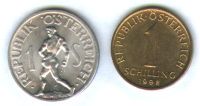 schilling, S., Sch.
n.
schilling, S., Sch.
n.- from Schilling "shilling": the standard
monetary unit of Austria before the euro; a coin of this value; a
former minor coin of Germany [< German Schilling <
Middle High German schillinc < Old High German scilling;
English shilling < Middle English schilling <
Anglo-Saxon scylling; the basic sense of the Indo-European
root may have been "that which is cut off from a piece of metal
for use as money" or "a small shield"].
- "The entrance charge was twenty schillings, two-thirds
as much as the Kunstmuseum, but it was hardly two-thirds as
good." Bill Bryson, Neither Here Nor There: Travels in
Europe, 1991, p. 258.
- "Saggy midsection, that loses the thread in too much
uninteresting talk, takes some of the shine off the picture but this
could still pull in a few schillings in select European markets."
Derek Elley, "Hold-Up", Variety, Sep. 4, 2000.
- "ERWIN SCHRODINGER (1887-1961) CURRENCY:
Austrian, 1,000 schillings ($57 when last issued, in 1983)",
Edward F. Redish, "Cold, Hard Proof that Science Has Cultural
Currency", Discover, Nov. 1999.
- to schlepp, to schlep v.i., v.t.
- related to schleppen "tow": drag, lug,
tote; move slowly or tediously [Yiddish shlepn < Middle
High German sleppen < Middle Low German slepen].
(A laptop computer in German is humorously called a Schlepptop.)
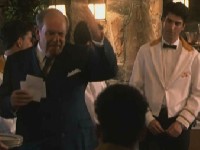 "And show the goddam daughters a good
time—all the daughters, even the dogs. Schlepp 'em out to the
terrace. Show 'em the stars. Romance 'em any way you want." Dirty Dancing, starring Patrick Swayze
& Jennifer Grey, 1987.
"And show the goddam daughters a good
time—all the daughters, even the dogs. Schlepp 'em out to the
terrace. Show 'em the stars. Romance 'em any way you want." Dirty Dancing, starring Patrick Swayze
& Jennifer Grey, 1987.- "My mom schlepped her watermelon breasts to the doctor
at once." Fran Drescher, Enter Whining, 1996, p. 40. This book
mentions to schlepp seven times.
- "'You talk about schlepping peppers with a girl named
Debra, I think, or perhaps you are escaping from leopards across the
sea.'" Garrison Keillor, "Buddy the Leper", The Book of Guys, 1993.
- schlieren n.pl. (sing. schliere)
- from Schlieren "streaks": small streaks or
masses in igneous rocks.
- schlockmeister n.
- See -meister.
- schmaltz, schmalz n.
- related to Schmalz "rendered fat":
sentimental or florid music or art; unctuous sentimentalism [Yiddish shmalts
< German Schmalz < Middle High German smalz].
- "On a radio dial full of headbanger music and honkytonk
and religious schmaltz and the steady whanging of commercials, public
radio brings you worthwhile and even beautiful things." Garrison
Keillor, Wobegon Boy, 1997, p. 127.
- "It's ['Angie'] quite a straight, schmaltzy pop tune,
with the piano and string arrangement so prominent, which is probably
why it was so popular in Latin countries at the time." Mick
Jagger, insert in Jump Back: The Best of the Rolling
Stones, CD, 1997.
- Primal Schmaltz, CD, by Jo Swan, 1998.
- More books and products related to schmaltz
- schmier, shmier, shmir, schmear,
shmear, schmeer, shmeer n., v.t.
- related to Schmiere, schmieren "ointment, salve,
smear, grease, lubricant, greasy dirt, bribe, scrawl, scribble": a
mass or group of related things ("the whole schmear"); a
spread, often cream cheese on a bagel; to spread; a bribe; to bribe
[< Yiddish shmir, shmeer "smear, smudge" < shmirn,
shmiren, schmeeren "to smear, grease" < Middle High German
smiren < Old High German smirwen, related to
Pennsylvania German schmear "fat, grease"]. This
entry suggested by Christian
Macho. See also schmierkase.
- "If the first or the last fiddle, the timpani or horn,
the flute or oboe takes off with his own interpretation, the result
will be not only anarchy, but such a schmier, such a mishmash that the
audience will run away in horror!" Uta Hagen, Respect for Acting, 1973, p. 198. This
is a meaning I have not found in dictionaries as it appears to mean a
group of unrelated things rather than similar things.
- "You eat usually eggs and toast mit raspberry shmier for
breakfast, ze garbage fast food for lunch, maybe ze wiener made from pig balls or a slice of Scheisse you call pizza." David Ives, Time Flies and Other Short Plays, 2001,
p. 45. This is a German character speaking in a play.
- "'Was your son given free rein to access whatever web
sites he liked, including, say, violent or pornographic ones?' 'Oh, we
did the whole parental-controls schmear, but Kevin cracked it in a
day.'" Lionel Shriver, We Need to Talk About Kevin: A Novel,
2003, p. 45.
- "Try '99 bagels with schmear on the wall, 99 bagels with
schmear' to kill even the strongest bagel cravings." Cameron
Tuttle, The Bad Girl's Guide to the Open Road,
1999, p. 1.
- "They are high-class, high-performance mostly
Stratocaster-like guitars, available in spectacular custom colors
including 'psychedelic vomit' and even 'haz-mat-sewage-fiasco
shmear.'" Tony Bacon, Electric Guitars: The Illustrated
Encyclopedia, 2000, p. 203.
- "'How about an extra five over the meter?' 'You're on.
Get in.' Ah, the power of the schmeer." Steve Karmen, Me and Bobby D.: A Memoir, 2003, p. 351.
- "'That's fine,' said Boaz. 'Only wear a broad-brimmed
hat and shmeer yourself with lotion. Otherwise you'll get red as a
tomato, and they'll pick you by mistake.'" Erich Segal, Acts of Faith, 2003, p. 202.
- Schmierchemie n.
- from Schmierchemie "messy chemistry": a
derisive term for biochemistry [< German Schmierchemie <
schmieren (see schmier) + Chemie
"chemistry"].
- "No wonder 'real' chemists sneered at biochemistry,
called it 'Schmierchemie', which they continued to do until much more
recently than 1859!" (p. 22), "All animal chemistry used to
be disparaged by the dictum, 'Tierchemie ist Schmierchemie'." (p.
261) Charles Tanford & Jacqueline Reynolds, Nature's Robots: A History of Proteins,
2001.
- "'This heralds the end of organic chemistry: let's
finish off the terpenes, and only the smears ('Schmieren') will be
left!' [the derisive term Schmierchemie was used by organic
chemists to denote physiological chemistry, or biochemistry as it is
now known]." Walter Gratzer, Eurekas and Euphorias: The Oxford Book
of Scientific Anecdotes, 2002, p. 134.
- "No one knew how to purify, isolate, synthesize, or
identify their huge and immensely complicated structures. German
chemists condescendingly referred to organic chemistry as
'Schmierchemie,' or grease chemistry, and no large university in the
United States devoted a department to large polymers." Sharon
Bertsch McGrayne, Prometheans in the Lab, 2002, p. 120.
- "It was grueling, unglamorous work. Tierchemie,
runs an old German expression, ist nur Schmierchemie (Animal
chemistry is just the chemistry of slimes and messes)." Barry
Werth, Billion Dollar Molecule: The Quest for
the Perfect Drug, 1995, p. 66.
- schmierkase, Schmierkaese, shmierkase,
smierkase, smiercase, smearkase, smearcase n.
- related to Schmierkäse "soft cheese, cheese
for spreading": chiefly North Midland U.S., any cheese suitable
for spreading or eating with a spoon, especially cream cheese or (a
sour) cottage cheese, therefore a synonym for schmier
[< Pennsylvania German Schmierkees < German Schmierkäse
< schmieren (see schmier) + Käse
"cheese" < Middle High German kaese < Old High
German kasi < Latin caseus]. See also schweizerkäse.
- "This cheese [cottage cheese] goes by many other names:
clabber, pot, Dutch, farmer's, Schmierkaese and bakers'."
Irma S. Rombauer & Marion Rombauer Becker, Joy of Cooking,
1964, p. 513. In the 1997 edition of the same book, the word is
spelled Schmierkase (p. 536).
- "Pork and sauerkraut, chicken
soup with saffron, schmierkase (similar to cottage cheese)
with apple butter, and the vast array of pickles and pies that made up
the famous 'Seven Sweets and Seven Sours' seem to have been exotic
enough for the average American's taste." David J. Walbert, Garden Spot: Lancaster County, the Old
Order Amish, and the Selling of Rural America, 2002, p. 87.
- "They wandered like children on a school trip, listening
to the strange Germanic inflections of the farm wives who sold them
such exotica as cup cheese, shmierkase, sause, meringue kisses, and
eggs boiled in beet juice." Leslie Chang, Beyond the Narrow Gate: The Journey of
Four Chinese Women from the Middle Kingdom to the Middle America,
2000, p. 113.
- "smierkase > cottage cheese", index entry, Alan
Davidson, The Oxford Companion to Food, 1999, p.
891.
- "The meal typically involves slices of bread, peanut
butter, smearcase (cheese spread), pickled vegetables, snitz (dried
apple) pie, and coffee." Donald B. Kraybill, The Riddle of Amish Culture, 2001, p.
352.
- "She fed her little turkeys with boiled egg or
smearcase, as my Grandmother Milhous always called clabber cheese
(cottage)." Jessamyn West, Hide And Seek: A Continuing Journey,
1987, p. 261.
- "Schmierkäse has become smearkase,
and the sauer in sauer-kraut
and sauer-braten is often spelled
sour." H.L. Mencken, The American Language, 1936, p. 411.
Mencken may have meant smearcase here since he spelled it
that way at two other points in the book. Besides he is trying to
emphasize the American spelling of foreign words.
- schmuck, shmuck, schmo, schmoe,
shmo n.
- probably not related to Schmuck
"jewelry, decoration, adornment": a jerk, oaf, fool. This
word would normally not be included here because it probably does not
come from German, but so many people have asked me about it that I am
including an explanation. The mildly offensive English word schmuck
is from the very offensive Yiddish word schmock, shmok
"fool, penis." This much is certain.
Most dictionaries say the Yiddish word probably comes from Polish smok
"snake, tail," although at least one says it probably comes
from Slovenian, which, like Polish, is Slavic, not Germanic. The
problem is that schmuck looks German, and there is even a
German word Schmuck. One could even draw a connection between
the Yiddish and German meanings ("penis" and
"jewelry" respectively) with the expression "family
jewels," but this is probably pure coincidence.
To complicate matters, at least one dictionary says the literal meaning
of the Yiddish word is "a pendant" (which again could be a
connection to jewelry) and that it is related to Old High German smocko,
from which we get smock, a garment that hangs around one's
neck.
It gets worse: One dictionary I found said the Yiddish word does indeed
come from German Schmuck (without even a
"probably"). Go figure.
Many dictionaries avoid the question altogether (or are extremely
honest) and say "origin unknown" or leave it at
"Yiddish" (if they include the entry at all).
- schnapps, schnaps n.
- from Schnaps "spirits, brandy, gin". See
also kirschwasser.
- "They danced and pounded and threw back beers and shots
of peppermint schnapps and whatever else they could lay their hands
on." T.C. Boyle, Drop
City, 2004, p. 271.
- "Larry had lives in a house that reeked of garbage; he
was addicted to crème de banana and licorice schnapps."
Garrison Keillor, Wobegon Boy, 1997, p. 17.
- "Only the old war-horses in Finland sometimes reminisce
about it over a late-night schnapps." Eloise Engle & Lauri
Paananen, The Winter War: The Soviet Attack on
Finland 1939-1940, 1973, p. viii.
- "A pigtailed Tyrolese, seen at a celebration in
Jochberg, carries a cask of Enzian schnapps, a liquor made from roots
of the gentian, an Alpine wildflower." George W. Long,
"Occupied Austria, Outpost of Democracy" National Geographic, Jun. 1951, p. 780.
- "'You would let a good man die sooner than give him a
drop of schnapps. That's what you Germans call economy.'" Joseph
Conrad, Lord Jim, 1900.
- "'Rum is warm,' mumbled the old man, rocking to and fro
in his chair, 'and schnapps is warm, and there's 'eat in soup, but
it's a dish o' tea for me.'" Arthur Conan Doyle, Round the Red Lamp, 1894.
- More books and products related to schnapps, schnaps

- schnauzer n.
- from Schnauzer "moustache": a breed of
rough-haired terrier. See further example under affenpinscher.
- "It was some kind of miniature schnauzer with a
silver-gray beard, like its master's." John Irving, The Fourth Hand, 2001, p. 225.
- Miniature Schnauzer Champions, 1952-1987,
1988
- Miniature Schnauzers Today, by Peter
Newman, 1998
- Standard Schnauzer (Rare Breed), by
Barbara M. Dille, 1997
- Grooming the Schnauzer, directed by
Jerry Welch
- More books and products related to schnauzer
- schnitzel n.
- See Wiener schnitzel.
- to schnorr v.i.,
v.t., to be on the
schnorr v.i.
- related to schnorren "(colloquial) to beg":
(colloquial) to beg. See also schnorrer. This
entry suggested by Brian.
- schnorrer, shnorrer n.
- related to Schnorrer "(colloquial) beggar":
(colloquial) beggar, cadger, moocher, sponger, chiseler, scrounger,
bum, parasite [Yiddish schnorrer, shnorer "beggar"
< German Schnorrer "beggar" < schnorren
"to beg" < schnurren "to whir, purr"
(because of the musical instruments carried by the beggars) < Middle
High German snurren (of echoic origin)].
 "Here comes Captain
Spaulding, the African explorer—did someone call me,
schnorrer?", Groucho Marx in Animal Crackers, 1930.
"Here comes Captain
Spaulding, the African explorer—did someone call me,
schnorrer?", Groucho Marx in Animal Crackers, 1930.- "He was speaking figuratively, the way a person might
call even a rich fund-raiser a 'schnorrer' (Yiddish for beggar),
despite the literal incongruity of such an appellation.", Philip
Greenspun, Philip and Alex's Guide to Web
Publishing, 1999.
- "'That's Shnorrer, the beggar,' he says, indicating an
aged man whose glazed eyes are always zeroing in on leftovers.",
Ed Leibowitz, "Market Watch" Los Angeles Magazine, Oct. 2001.
- schottische, schottish n.
- from (der) schottische (Tanz) "(the) Scottish
(dance)": a round dance similar to but slower than the polka;
music for the schottische.
- "He's thought about becoming a choreographer and forming
his own company, but the name Bob Anderson, the Bob Anderson Company,
kinda suggests folk dance, doesn't it, to you? I mean, people working
in schottisches, basically." Garrison Keillor, "The News from Lake Wobegon", A Prairie
Home Companion, Sept. 13, 2008.
- "I attended private parties in sumptuous evening dress,
simpered and aired my graces like a born beau, and polkaed and schottisched with a step
peculiar to myself—and the kangaroo." Mark Twain, Roughing It, 1871.
- "He taught certain uncouth lads, when they were of an
age to enter society, the intricacies of contra dances, or the steps
of the schottische and mazurka, and he was a marked figure in all
social assemblies, though conspicuously absent from town-meetings and
the purely masculine gatherings at the store or tavern or
bridge." Kate Douglas Smith Wiggin, Rebecca of Sunnybrook Farm, 1903.
- "During the whole evening the bands of the
Préobrajensky and Paulowsky regiments had played without
cessation polkas, mazurkas, schottisches,
and waltzes from among the choicest of
their repertoires." Jules Verne, Michael Strogoff: A Courier of the Czar,
1911.
- "Flying Cloud Schottische", Come and Trip It - Instrumental Dance
Music 1780s-1920s, composed by Gilles Jullien, Traditional, et al.,
1994
- "Rainbow Schottisch", "Jennie's own
Schottische", By The Old Pine Tree, composed by
Stephen Foster and Sidney Lanier, 1996
- More CDs and products related to schottische
- schpiel n., v.i., v.t.
- See spiel.
- schrank n.
- related to Schrank "cabinet, closet,
cupboard": a two-door clothes cabinet one side of which has
drawers and shelves and the other side an open space for hanging
clothes [< Pennsylvania German < German]. This entry suggested by
Jan Neidhardt.
- "Hearing the commotion, the Siamese ventured down from
the top of the Schrank and yowled outside the kitchen
door." Lilian Jackson Braun, The Cat Who Talked to Ghosts, 1990, p.
229.
- "She let us take that black walnut chest that stands in
her living-room. She called it a kas or schrank."
Kathryn Kenny, The Mysterious Code (Trixie Belden #7),
2004, p. 224.
- "I never went into the elegantly curved Schrank
that held Mutti's and my father's wardrobes, a lady's vanity, and two
nightstands." Wolfgang Samuel, German Boy: A Child in War, 2001, p. 14.
- "It was a tall cupboard, or Schrank, black with
age, but still sound." Elizabeth Peters, Borrower of the Night: The First Vicky
Bliss Mystery, 2000, p. 109.
- "We took a huge Belgian schrank [cupboard] and
put it against the wall to the north for added protection."
Gerold Astors, A Blood-Dimmed Tide: The Battle of the
Bulge by the Men Who Fought It, 1993, p. 226.
- "Pennsylvania-German (Amish): Neighbors give the couple
practical items (such as a schrank—a handpainted storage
piece) for their new home." editors of Bride's magazine,
Bride's Book of Etiquette, 2003, p. 271.
- "Pennsylvania Dutch furniture—the great Schranks
('wardrobes'), the dower chests, the painted clocks, chests of
drawers, and all the rest—has achieved national attention in our
century." Don Yoder, Hex Signs: Pennsylvania Dutch Barn
Symbols & Their Meaning, 2000, p. 6.
- schtoom, schtum adj.
- See shtum.
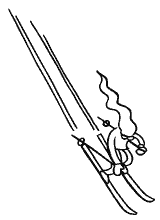 schuss
n., v.i.
schuss
n., v.i.- from Schuß "a shot": in skiing, a
straight descent with no attempt to decrease speed; to execute a
schuss.
- "For communications junkies who dread the thought of
losing touch while schussing down the Swiss Alps or hiking the
Himalayas, one word: relax." William Reiser, Time, Dec. 2, 1996.
- "Whether harmless dribbles or million-ton masses more
than a mile wide, avalanches tend to schuss down the same runs year
ofter year." Sharon Begley, "Taming the White Dragon",
Newsweek, Mar. 8, 1999.
- Schutzstaffel,
S.S., SS., SS n.
- "protective rank, defense corps": the personal
bodyguard of Adolf Hitler; later, the Elite Guard of the Nazi militia, the Black Shirts. See also Waffen SS. See further examples under Gestapo and Kommandant.
 The SS, Alibi of a Nation, 1922-1945, by
Gerald Reitlinger, 1991.
The SS, Alibi of a Nation, 1922-1945, by
Gerald Reitlinger, 1991.- "Since 1995, when [Jörg] Haider last spoke of the
SS, his popularity has grown dramatically." Andrew Purvis,
"Forward into the Past", Time, Feb. 7, 2000.
- Hitler's Children: The Hitler Youth and
the SS, by Gerhard Rempel, 1991.
- For Fuhrer and Fatherland: SS Murder and
Mayhem in Wartime, by Roderick de Normann, 1997.
- More books and products related to Schutzstaffel, SS
- schvitz n., v.i.
- See shvitz.
 schwa n.
schwa n.
- from Schwa: weak, neutral vowel sound found in most
unstressed syllables in English, e.g. the a in alone,
the e in happen, the i in easily,
the o in gallop and the u in circus,
represented by an upside-down e [< German Schwa
< Hebrew sh'wa, shewa, the name of a diacritic mark used
instead of a vowel].
- "On the other hand, we more freely admit a dead schwa
into -ile words such as fragile, hostile,
and mobile (though not, perversely, into infantile
and mercantile) where the British are, by contrast,
scrupulously phonetic." Bill Bryson, The Mother Tongue: English and How it
Got that Way, 1990, p. 89.
- "The glyph /*/ is used for the 'schwa' sound of
unstressed or occluded vowels (the one that is often written with an
upside-down 'e')." Eric S. Raymond, The New Hacker's Dictionary.
- More books and products related to schwa
- schweizerkäse,
Schweizerkäse n.
- from Schweizer Käse "Swiss cheese".
See also schmierkase.
- "He had an engagement to take supper with several of his
intimates at the Irving Place café, where he could throw aside
the heaviest parts of his pose and give way to his appetite for beer
and Schweizerkäse sandwiches." David Graham
Phillips, Fortune Hunter, 1906.
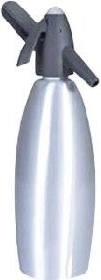
 seltzer
seltzer
 , Seltzer,
seltzer water n.
, Seltzer,
seltzer water n.- from Selterser (Wasser) "(water) of
Selters": naturally fizzy mineral water, soda water [< German Selterser
"from Selters" < (Nieder-) Selters, village near
Wiesbaden with mineral springs < Saltarissa, Saltrissa,
related to German Salz "salt"].
- sheiss, sheisse n.
- See scheisse.
- sheister n.
- See shyster.
- shice n.
- See scheisse.
- shicer, schicer n.
- probably from Scheißer "contemptible
person, coward": Australian English, an unproductive mine or
claim; slang, a swindler, welsher or cheat; an unscrupulous person; a
worthless thing; a failure [German Scheißer literally
"one who moves one's bowels" < scheißen
"to move one's bowels" < Middle High German schizen
< Old High German scizen, skizzan + -er
"-er"]. See also shyster, scheisse.
- "One such [term from goldfields slang] was SHICER
(from British slang for someone considered worthless) and applied in
Australia to a worthless mine. By the 1890s SHICER had
come to mean a criminal type of person, surviving into the present as
SHYSTER." Graham Seal, The Lingo: Listening to Australian
English, 1999, p. 142.
- "Millie heard the name as Shickster, but that couldn't
be the case because this nattily dressed pillar of the community was
beyond reproach. Glory heard Shice, or Shicer, but that couldn't have
been correct either, because the lady in question religiously attended
church each and every Friday and alternate Sundays." Theodore L.
Kloski, Winter Quarter for Bees, 2005, p. 309.
- shiseter n.
- See shyster.
- shlockmeister n.
- See -meister.
- shmier, shmir, shmear, shmeer n.,
v.t.
- See schmier.
- shmierkase n.
- See schmierkase.
- shnorrer n.
- See schnorrer.
- shtum, schtum,
shtoom, schtoom, stumm adj.
- related to stumm "silent": quiet, silent,
secretive, unwilling to give information or details about something
[Yiddish shtum, related to German stumm "silent,
dumb (unable to speak)"]. This entry suggested by Sarah Hart.
- "No opportunity to spread bug awareness should be
missed, even when protocol demands you keep shtum", Karl Feilder,
"Not so presidential but a class act anyway", Computer
Weekly, Jun. 24, 1999.
- shvitz bod, shvitz, schvitz n.,
v.i.
- related to Schwitzbad "steam bath, sauna":
a steam bath, to take a steam bath; to sweat, therefore shvitzing
means "extremely hot" [Yiddish shvitz bod, related
to German Schwitzbad < German schwitzen "to
sweat" + Bad "bath"]. This entry suggested by Sarah Hart.
- "A no-frills bath in the old style, a shvitz, a place
where we sit in steam, in wet heat, in dry heat, in a room that sounds
like something from the Arabian Nights: the Radiant Room." Mary
Gordon, "Still Life", Harper's Magazine, Dec. 1998.
- "So, Shvitz City it may be, but wipe your eyes and
remember what you came looking for." Hal Rubenstein, "Why
August in New York might just be heaven on earth", Interview, Aug. 1996.
- "You may feel you've spent the plays [sic] brief running
time on a sort of intellectual Stairmaster, panting to keep up with
all the smart talk. And when you get off, you may wonder if all that
schvitzing was worth it." Charles Isherwood, "Honour",
Variety, Apr. 27, 1998.
- "There--dazed, daunted and schvitzing--we immediately
found ourselves amidst Hammocks, a magnanimous installation by the
American artist Patrick Killoran, of approximately 20 modified but
perfectly functional string beds attached to pillars, in the shade of
the pier's lovely old industrial arcade." Lisa Liebmann, "A
Summer Place", Art in America, Jun. 1999.
- "'All I know is that in high school, you know, I was
always kind of a tense person,' she said. 'A schvitzer, you might
say.'" Ian Blecher, "Acid Reflux, Chic Gastric Ailment,
Replaces the Ulcer--Ask Gandolfini", The New York
Observer, Mar. 12, 2001.
- The Shvitz (The Steambath), directed by
Jonathan Berman.
- shyster, sheister, scheister, shiseter, shyseter n.
- probably from Scheißer "contemptible
person, coward": slang or informal insult, an unscrupulous,
dishonest, underhanded, unethical or questionable practitioner,
especially a lawyer or politician, a pettifogger. [Some dictionaries
say shyster comes from Scheißer without
mentioning shicer; others, including Merriam-Webster, say it
comes from Scheißer through shicer. One says it
may come from shy, but that this is dubious. Many say,
"origin unknown", and some say it may come from the name of a
disreputable 19th-century New York lawyer called Scheuster, but none of
them seem to know his first name. Many other origins have been
conjectured.] See also shicer, scheisse.
- "Next we come to His Excellency the Prime Minister, a
renegade American from New Hampshire, all jaw, vanity, bombast, and
ignorance, a lawyer of 'shyster' caliber, a fraud by nature, a humble
worshiper of the scepter above him, a reptile never tired of sneering
at the land of his birth or glorifying the ten-acre kingdom that has
adopted him—salary, four thousand dollars a year, vast
consequence, and no perquisites." Mark Twain, Roughing It, 1994, p. 362.
- "They are the epitome of stability in a fast shifting
culture full of shifty shiftless sheisters." Stephen Powers, The Art of Getting Over: Graffiti at the
Millennium, 1999, p. 113.
- "I left them with the parting shot that they should have
their scheister call my lawyer, when convenient." Tony &
Sandra Midea, A Fool's Guide To Landlording, 2004, p.
115.
- sitz
bath, sitz-bath n.
- from Sitzbad "seat + bath; sitting bath": a
bath one takes in a sitting position; a tub or basin used for such a
bath.
 "Sitz Bath
& Heat Treatment", sign on a spa door in Thunderball, a James Bond movie starring Sean Connery, 1965.
"Sitz Bath
& Heat Treatment", sign on a spa door in Thunderball, a James Bond movie starring Sean Connery, 1965.- "So he sat on the floor, and lit a pipe which I gave
him, threw one of my red blankets over his shoulders, inverted my
sitz-bath on his head, helmet fashion, and made himself picturesque
and comfortable." Mark Twain, "A Ghost Story", Sketches New and Old, 1903.
- "She added hot baths, sitz baths, shower baths, and
plunges." Mark Twain, The Adventures of Tom Sawyer, 1876.
- "The cool air above, and the continual bathing of our
bodies in mountain water, alternate foot, sitz, douche, and plunge
baths, made this walk exceedingly refreshing, and we had travelled
only a mile or two, after leaving the torrent, before every thread of
our clothes was as dry as usual, owing perhaps to a peculiar quality
in the atmosphere." Henry David Thoreau, The Maine Woods, 1858.
- "The medical staff X-rayed the patient's scrotum to
locate the staples, and gave him tetanus antitoxin, broad-spectrum
antibiotics, and a hexachlorophene Sitz [sic] bath prior to surgery
the next morning." Wendy Northcutt, The Darwin
Awards, 2000, p. 266. Sitz was capitalized in this example,
perhaps due to a mistaken impression that the term was derived from
the supposed inventor's name.
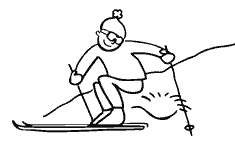 sitzmark
n.
sitzmark
n.- from Sitzmarke "seat + mark; mark made by
sitting": a depression left in the snow by a skier falling
backward.
- smierkase, smiercase, smearkase, smearcase n.
- See schmierkase.
- sourbraten n.
- See sauerbraten.
- sourkraut, sourkrout, sour-krout n.
- See sauerkraut.
- spiegeleisen n.
- from Spiegeleisen "mirror iron": a pig iron
containing manganese and carbon.
- spiel, schpiel
n., v.i., v.t.
- from Spiel; spielen "game, play; to play":
voluble, mechanical, often extravagant talk, especially a sales pitch
[< German spielen "to play" or Yiddish shpiln,
both < Old High German spilon, related to Old English spilian
"to revel"].
- "It [Howard's speech] was equal parts disclosure, pep
talk and closer's spiel, and he never looked her in the face the whole
time he was delivering it, and he went on delivering it for the better
part of the three days and two nights she was to spend in his
company." T.C. Boyle, Drop
City, 2004, p. 115.
 "Then, remembering her position,
she gave me a little bit of the official line—a brief, practised,
articulate spiel to the effect that one should never forget that the
[Appalachian] trail is not insulated from the larger ills of society
but that statistically it remains extremely safe compared with most
places in America." Bill Bryson, A Walk in
the Woods, 1997.
"Then, remembering her position,
she gave me a little bit of the official line—a brief, practised,
articulate spiel to the effect that one should never forget that the
[Appalachian] trail is not insulated from the larger ills of society
but that statistically it remains extremely safe compared with most
places in America." Bill Bryson, A Walk in
the Woods, 1997.- "I mean, I didn't want to sound difficult, but they did
give Twiggy the same spiel." Fran Drescher, Cancer Schmancer, 2002, p. 105.
- "Becker launched into his same spiel, a German tourist
who was willing to pay top dollar for the red-haired girl who was out
with his brother today." Dan Brown, Digital Fortress, 1998, p. 110.
- "'Heaven's a joke, the kind of thing your
Reverend Martin would spiel happily on about for hours, if you kept
buying him shots and beers—it's no more real than Tom
Billingsley's fishes and horses!'" Stephen King, Desperation, 1996.
- "He sat there and doodled with his blue pencil on a
tablet, listening to me spiel to him for three or four minutes before
he got a word in." Malcolm X & Alex Haley, The Autobiography of Malcolm X, 1992.
 "Joe was giving him the whole
spiel about static electricity and was doing it well." Nicholas
Evans, The
Horse Whisperer, 1995, p. 375.
"Joe was giving him the whole
spiel about static electricity and was doing it well." Nicholas
Evans, The
Horse Whisperer, 1995, p. 375.- More books and products related to spiel
- spieler n.
- from Spieler "player": one who does the
above.
- "'You're a fair spieler, child.'" Sinclair Lewis, Main Street, 1920.
- Sprechgesang n.
- from Sprechgesang "speaking song": a vocal
style between singing and speaking, speech-song [German sprechen
"to speak" + Gesang "song, singing"]. See
also Sprechstimme. This entry suggested by
Christiane
Leißner.
- "To signify Moses' inability to articulate God's
inexpressible nature, Schoenberg wrote this role using Sprechgesang, a
combination of song and speech that British bass John Tomlinson
navigates with powerful finesse." Charles Isherwood, "Moses
und Aron", Variety, Feb. 22, 1999.
- Sprechstimme, sprechstimme n.
- from Sprechstimme "speaking voice": a voice
part employing Sprechgesang [German sprechen
"to speak" + Stimme "voice"].
- "In works such as the 1912 Pierrot lunaire, Arnold
Schoenberg invented the device of sprechstimme, or speech-song; in The
Cave Reich has perfected the principle and built an entire work upon
it." Michael Walsh, "Music: Words Sliced And Diced", Time, May 31, 1993, p. 69.
- "When the men vocalize-Ewan McGregor in more than mezza
voce, and Jim Broadbent in spunky sprechstimme-I suspect that the two
masculine names billed in the credits as 'vocal doubles' deserve the
applause." John Simon, "Nic & J-Lo", National Review, Jun. 11, 2001.
- spritz v.i.,
v.t., n.
- from spritzen "to squirt, spray, sprinkle,
spatter; inject".
- "While packing it for the plane ride home, she insisted
that the mirror was dirty and spritzed it with Windex." Fran
Drescher, Enter Whining, 1996, p. 31.
- "Soon I had met beetles that move through water by
walking on the underside of the surface as though it were a glass
ceiling and beetles that jet ski on top with the aid of compounds
spritzed from their abdomens...." Douglas H. Chadwick,
"Planet of the Beetles" National Geographic, Mar. 1998.
- spritzer n.
- from Spritzer "a splash, spatter, rain shower,
spritzer": a beverage of usually white wine and soda water [perh.
< Pennsylvania German < German Spritzer < spritzen
"to spray"].
- "The combination of a white-wine spritzer and a tilted
bladder put me badly in need of a bathroom, but oddly enough, it was
always occupied, and there seemed to be several voices coming from
behind the locked door." Fran Drescher, Enter Whining, 1996, p. 48.
- "Eh, no big loss, I can't be charming and keep my
lipstick on with a rumaki in one hand and a spritzer in the other
anyway." Fran Drescher, Enter Whining, 1996, p. 224.
- SS, S.S., SS. n.
- See Schutzstaffel.
- stalag, Stalag
n.
- from Stalag short for Stammlager "main
camp": a German camp for prisoners of war, especially in World War
II.
- stark adj.
- related to stark "strong": stiff, rigid,
standing out, bleak, desolate, barren, sheer, utter, downright, hard,
harsh, severe, strong, powerful [Middle English starc <
Anglo-Saxon stearc]. Stark doesn't come from Modern
German but rather from Middle English and Anglo-Saxon and therefore has
common roots with Modern German. The spelling and meaning are so
similar that I have included it here. This entry suggested by Brigitte.
- Stasi n.
- the internal security force or secret police of the former
German Democratic Republic (East Germany) [short for German Staatssicherheitspolizei
or -dienst "State security police or service" < Staat
"State" + Sicherheit "security, safety"].
- "They're the perpetrators of the Stasi secret
police—who like the Nazis before them
feel no remorse." Stefan Thiel, "Old Stasi Never Die",
Newsweek, Dec. 10, 2001, p. 39.
- "This time the artists shot in the abandoned Berlin
headquarters of the East German secret police, known as the Stasi, and
the results are spectacular." Brooks Adams, "Jane and Louise
Wilson at 303", Art in America, Oct. 1998.
- "Interviewees run an intriguing gamut, from an East
Berlin minister to a former Stasi official and Bavarian entrepreneur
whose longtime dream to 'recycle the Wall' (literally, as road and
building-foundation raw material) duly came true." Dennis Harvey,
"After the Fall", Variety, May 8, 2000.
- Stasi: The Untold Story of the East
German Secret Police, by John O. Koehler.
 stein n.
stein n.
- from Stein "stone": a large (earthenware)
mug used especially for beer; the quantity of beer that a stein holds;
(in mining) stonework used to secure the sides of a shaft. See further
example under lederhosen. See also Ehrenbreitstein, Frankenstein.
- "We camped together in a high Alpine pass, somewhere
along the road between Salzburg and Klagenfurt, and in the evening
walked into the nearest village, where we found awaiting us a perfect
inn, full of black panelled wood and a log fire with a sleeping dog
before it and ruddy-faced yeoman customers swinging steins of
beer." Bill Bryson, Neither Here Nor There: Travels in
Europe, 1991, p. 250.
- "When I returned for breakfast, local families were
already eating big platters of goulash, Wiener Schnitzels, and Würstel
(page 766), and drinking tall steins of beer." George W. Long,
"Occupied Austria, Outpost of Democracy" National Geographic, Jun. 1951, p. 771.
- "They went to the balcony of a big, noisy restaurant and
had a shore dinner, with tall steins of beer." Willa Sibert
Cather, Youth and the Bright Medusa, 1920.
- "Steins of lager beer were
ventured upon." Frances Hodgson Burnett, The Shuttle, 1907.
 steinbock,
steinboc, steinbok, steinbuck, stonebock, stonebuck n.
steinbock,
steinboc, steinbok, steinbuck, stonebock, stonebuck n.- from Steinbock "stone buck": a type of wild
goat in Europe, the European, Capra, Stone or Alpine Ibex (Capra
ibex); a type of antelope in Africa, the Steenbok (Raphicerus
campestris) [< German Stein "stone" + Bock
"male deer, goat or sheep", some of the spellings above no
doubt influenced by the Dutch steenbok]. See also Ehrenbreitstein, Frankenstein, stein.
- "In the Alps the Steinbock or stone ibex and chamois are
common, scrambling with ease over precipitous rocky hillsides, while
marmots emerging from holes in the ground make a screeching sound to
warn their mates at the first signs of danger." Michael Hambrey
& Jürg Alean, Glaciers, 2004, p. 221.
- "You may also see deer, chamois (Gemse), and an
occasional Steinbock (bouquetin), a mammal that is larger than a
deer." Marcia & Philip Lieberman, Walking Switzerland, the Swiss Way: From
Vacation Apartments, Hotels, Mountain Inns, and Huts, 1997, p. 51.
- "It amounted to 2430 zebra, 967 wildebeeste, 846 Coke's
hartebeeste, 932 Grant's gazelle, 546 Thomson's gazelle, 146 impala, 8
steinbock, 2 duiker, 46 eland, 19 giraffe, 1 rhinoceros, 86 ostrich, 1
cheetah, 5 hyaena and pack of 7 hunting dogs." Rick Ridgeway, The Shadow of Kilimanjaro, 1999, p. 54.
 Steppenwolf n.
Steppenwolf n.- from Steppenwolf "steppe wolf": a US rock
band founded by German American John Kay (born Joachim Fritz
Krauledat), named for the book Steppenwolf by German author
Hermann Hesse [< German Steppe "steppe" + Wolf
"wolf"].
- "Then they would either explode and separate forever,
and there would be no more Steppenwolf, or else they would come to
terms in the dawning light of humor." Hermann Hesse, translated
by Basil Creighton, Steppenwolf: A Novel, 2002, p. 56.
- "The Sunday morning kickoff featured Jay Leno as the
grand marshal and Peter Fonda as the honorary grand marshal (this town
ain't big enough for two marshals), while John Kay and Steppenwolf got
up god-awful early Sunday morning to play 'Born to Be Wild' at
Harley-Davidson of Glendale for the thousands who turned up to take
part in the 50-mile 'motorcycle caravan' that chugged along L.A.
freeways to Castaic Lake Recreation Center in Santa Clarita."
Paul Garson, Born to Be Wild: A History of the
American Biker and Bikes 1947-2002, 2003, p. 144.
- Steppenwolf
homepage
- Steppenwolf at SheetMusicDB.net
- strand n.,
v.i., v.t.
- related to Strand "beach": shore,
especially the ocean shore, that is, beach. Strand doesn't
come from Modern German but rather from Middle English, Old English and
Anglo-Saxon and therefore has common roots with Modern German. The
spelling and meaning are so similar that I have included it here.
- "A viewing of those gallant whales/That blew at every
strand." Herman Melville, Moby Dick, 1851, p. 174.
- "Far below us was the beach, from half a dozen to a
dozen rods in width, with a long line of breakers rushing to the
strand." Henry David Thoreau, Cape Cod, 1865.
- "He gazed with eyes that dared not focus too long on the
human jetsam and the wreckage flung up on the long narrow strand that
was the nearest landfall." Anne McCaffrey, The
Chronicles of Pern: First Fall, 1994.
 streusel n.
streusel n.- from Streusel "sweet crumbly topping":
mainly US, a crumbly topping or filling for cakes, breads and muffins
made of sugar, flour, butter, and often cinnamon and chopped nuts. The
resulting cake is called a streusel, streusel cake, coffeecake or
coffee cake. [< German Streusel "something
strewn" < Middle High German ströusel < ströuwen
"to strew, sprinkle" < Old High German strowwen,
strewen].
- "A related cooking term [to the straw in strawberry]
is streusel, an informally scattered topping on baked
goods." Harold McGee, On Food and Cooking: The Science and
Lore of the Kitchen, 2004, p. 265.
- "To add cold roux to a simmering liquid, work the roux
to break it up into small pieces, like a streusel topping, and then
scatter it into the simmering cooking liquid." Culinary Institute
of America, The Professional Chef, 2001, p. 536.
- "The audience held its breath, hoping they made it back
across the ring without the owner falling and turning her hip into
streusel." Emily Yoffe, What the Dog Did: Tales from a Formerly
Reluctant Dog Owner, 2005, p. 112.
- "Use your hands for mixing doughs, streusel toppings and
very thick mixtures, such as meat loaf." Betty Crocker, Betty Crocker's Cookbook: Everything You
Need to Know to Cook Today, 2000, p. 6.
- "Combine oats (set aside 1 tablespoon), GrapeNuts, and
jam in a food processor and process until jam is evenly distributed
and mixture has a streusel-like feel." Dean Ornish, Everyday Cooking with Dr. Dean Ornish:
150 Easy, Low-Fat, High-Flavor Recipes, 1997, p. 263.
- "Alyssa grabbed two small plates and put one of the
blueberry streusel muffins on each dish." Carly Phillips, Janelle
Denison & Jacquie D'Alessandro, Stroke of Midnight, 2004, p. 207.
- "'Our former secretary,' Jo snapped and rustled one hand
into the bag from the Leaf and Bean before pulling out a
cinnamon-streusel-topped muffin." Maureen Child, And Then Came You: Sam's Story, 2004, p.
7.
- strudel n.
- from Strudel "whirlpool": a kind of pastry.
See further example under bratwurst.
- stumm adj.
- See shtum.
- Sturm und Drang,
Sturm und Drang, sturm and drang n.
- from Sturm und Drang "storm and stress":
actually a movement in 18th-century German literature but often used
today simply to mean "turmoil".
- "'Durmstrang,' the name of the wizarding school that
admits only full-blooded wizards and has questionable links to Lord
Voldemort, comes from a German artistic style called Sturm
und Drang, which was a favourite of Nazi
Germany. As well, Durmstrang students arrive at Hogwarts in a ship
like the one featured prominently in a famous Sturm und Drang
opera." David Colbert, The Magical Worlds of Harry Potter: A
Treasury of Myths, Legends and Fascinating Facts, 2001, p. 15.
- "So dawned the time of Sturm und Drang: storm
and stress to-day rocks our little boat on the mad waters of the
world-sea; there is within and without the sound of conflict, the
burning of body and rending of soul; inspiration strives with doubt,
and faith with vain questionings." W.E. Burghardt DuBois, The Souls of Black Folk, 1903.
- "After six months of sturm and drang she had to let him
go." Bennet Cerf, Ed., Laughing Stock, 1945.
- Lovers, Parricides, and Highwaymen:
Aspects of Sturm Und Drang Drama (Studies in German Literature,
Linguistics and Culture), by Bruce Duncan, 1999
- The Impatient Muse: Germany and the
Sturm Und Drang (University of North Carolina Studies in the Germanic
Languages and Literatures, No 115), by Alan C. Leidner, 1994
Please do not plagiarize. If you would
like to use this information in a print or electronic publication,
please ask me for
permission first and cite this page as:
Knapp, Robbin D. 2009.
"GermanEnglishWords.com:
S". In Robb:
GermanEnglishWords.com. Jan. 5, 2009.
You can order most of the cited books and other media through Amazon simply by clicking on the titles.

 sauerbraten,
sauer-braten, sourbraten
n.
sauerbraten,
sauer-braten, sourbraten
n. from Sauerbraten "sour
roast": beef marinated in vinegar and seasonings before roasting
from Sauerbraten "sour
roast": beef marinated in vinegar and seasonings before roasting schilling, S., Sch.
n.
schilling, S., Sch.
n. "And show the goddam daughters a good
time—all the daughters, even the dogs. Schlepp 'em out to the
terrace. Show 'em the stars. Romance 'em any way you want." Dirty Dancing, starring Patrick Swayze
& Jennifer Grey, 1987.
"And show the goddam daughters a good
time—all the daughters, even the dogs. Schlepp 'em out to the
terrace. Show 'em the stars. Romance 'em any way you want." Dirty Dancing, starring Patrick Swayze
& Jennifer Grey, 1987.
 "Here comes Captain
Spaulding, the African explorer—did someone call me,
schnorrer?", Groucho Marx in Animal Crackers, 1930.
"Here comes Captain
Spaulding, the African explorer—did someone call me,
schnorrer?", Groucho Marx in Animal Crackers, 1930. schuss
n., v.i.
schuss
n., v.i. The SS, Alibi of a Nation, 1922-1945, by
Gerald Reitlinger, 1991.
The SS, Alibi of a Nation, 1922-1945, by
Gerald Reitlinger, 1991.
 "Sitz Bath
& Heat Treatment", sign on a spa door in Thunderball, a James Bond movie starring Sean Connery, 1965.
"Sitz Bath
& Heat Treatment", sign on a spa door in Thunderball, a James Bond movie starring Sean Connery, 1965. sitzmark
n.
sitzmark
n. "Then, remembering her position,
she gave me a little bit of the official line—a brief, practised,
articulate spiel to the effect that one should never forget that the
[Appalachian] trail is not insulated from the larger ills of society
but that statistically it remains extremely safe compared with most
places in America." Bill Bryson, A Walk in
the Woods, 1997.
"Then, remembering her position,
she gave me a little bit of the official line—a brief, practised,
articulate spiel to the effect that one should never forget that the
[Appalachian] trail is not insulated from the larger ills of society
but that statistically it remains extremely safe compared with most
places in America." Bill Bryson, A Walk in
the Woods, 1997. "Joe was giving him the whole
spiel about static electricity and was doing it well." Nicholas
Evans, The
Horse Whisperer, 1995, p. 375.
"Joe was giving him the whole
spiel about static electricity and was doing it well." Nicholas
Evans, The
Horse Whisperer, 1995, p. 375. Hogan's Heroes: Behind the Scenes at
Stalag 13, by Brenda Scott Royce & Werner Klemperer, 1998.
Hogan's Heroes: Behind the Scenes at
Stalag 13, by Brenda Scott Royce & Werner Klemperer, 1998. stein n.
stein n.
 steinbock,
steinboc, steinbok, steinbuck, stonebock, stonebuck n.
steinbock,
steinboc, steinbok, steinbuck, stonebock, stonebuck n. Steppenwolf n.
Steppenwolf n. streusel n.
streusel n.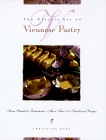 The Classic Art of Viennese Pastry: From
Strudel to Sachertorte--More Than 100 Traditional Recipes, by
Christine Berl, 1997
The Classic Art of Viennese Pastry: From
Strudel to Sachertorte--More Than 100 Traditional Recipes, by
Christine Berl, 1997


![]()